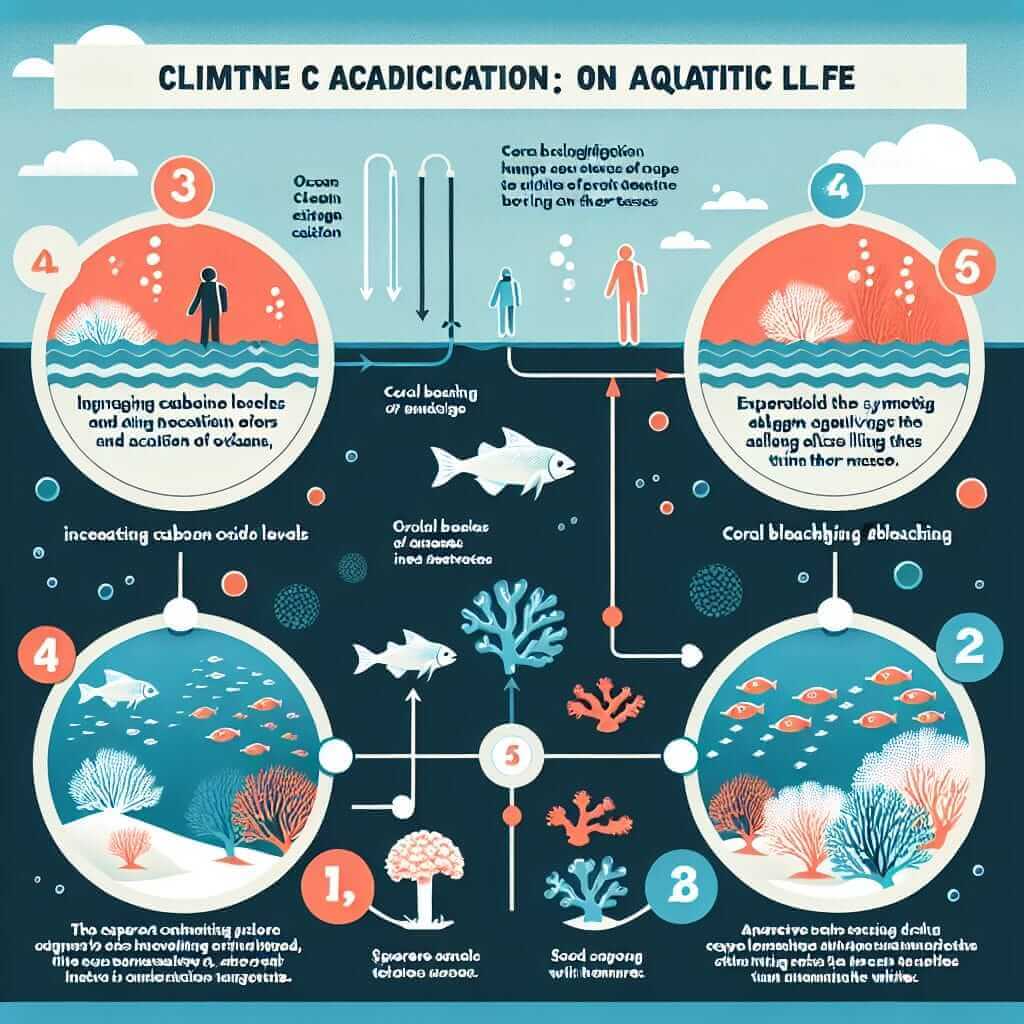Climate change has been a significant topic in the IELTS Writing Task 2 over the years. It has a diverse range of impacts, affecting not just terrestrial life but also marine ecosystems. The frequency of such topics in the IELTS exams underscores their importance and relevance. Historically, questions related to “The effects of climate change on marine life” have appeared periodically in the IELTS exam, making it a critical area for practice. Considering its potential recurrence, it is essential to prepare thoroughly for this topic. Below are some related past questions that have been found in IELTS exam papers:
- “Discuss the effects of global warming on oceans and their life forms.”
- “How does climate change impact marine biodiversity?”
Based on the pattern, these types of questions are likely to continue appearing in the future.
Main Content
Chosen IELTS Writing Task 2 Prompt
Climate change is significantly impacting marine life. Discuss both the positive and negative effects and give your opinion.
Analyzing the Prompt
This task requires a discussion of both the positive and negative effects of climate change on marine life. The word “discuss” indicates that you should present a balanced view. Furthermore, the prompt asks for your opinion, meaning that while you must objectively analyze both sides, your conclusion should reflect your stance.
Sample Essay
Introduction
Climate change is a pressing issue that transcends national borders, with remarkable repercussions on the planet’s oceans. These impacts on marine life are profound and multifaceted, encompassing both detrimental and, albeit fewer, positive aspects. This essay aims to explore both sides of the argument, ultimately asserting that the negatives far outweigh the positives.
Positive Effects
On the one hand, climate change has inadvertently created opportunities for certain marine species. For instance, some fish species have thrived due to the warmer ocean temperatures, which can bolster their reproductive rates. Additionally, the expansion of warmer seas allows tropical species to extend their range to previously colder regions, thereby increasing biodiversity in those areas.
Negative Effects
Conversely, the adverse effects of climate change on marine life are far more pervasive. Firstly, ocean acidification caused by increased CO2 absorption renders it difficult for calcifying organisms like corals and shellfish to sustain their shells and skeletons. This threatens the very foundation of some of the most diverse ecosystems on Earth. Secondly, rising sea temperatures have resulted in widespread coral bleaching, wherein corals expel the symbiotic algae vital for their survival. This not only diminishes biodiversity but also affects species reliant on these habitats for food and shelter.
Moreover, the alteration of ocean currents and patterns disrupts marine migration and breeding cycles. For example, many fish and whale species depend on precise temperature cues to navigate and reproduce. Disturbances in these cycles can lead to population declines and the potential collapse of entire fishery industries, thereby impacting human societies dependent on marine resources.
Conclusion
In conclusion, while there are some positives to the impacts of climate change on marine life, they are decidedly overshadowed by the devastating negatives. It is imperative that global efforts to mitigate climate change are intensified to preserve our priceless marine ecosystems.
Word Count: 311

Notes for Writing
When writing about this topic, keep the following notes in mind:
- Vocabulary: Use specific terms related to marine biology and climate science. Words like “ocean acidification”, “coral bleaching”, and “calcifying organisms” are crucial.
- Grammar: Ensure the use of complex sentences and appropriate linking words to connect ideas smoothly.
- Balance: Adequately discuss both positive and negative aspects before presenting your opinion.
- Structure: Follow a clear structure. Introduction, body (divided into positive and negative effects), and a conclusive opinion should be well-delineated.
Vocabulary to Remember
- Ocean Acidification (noun): /ˌəʊʃən ˌæsɪdɪfɪ’keɪʃən/ – The decrease in pH of the Earth’s oceans.
- Coral Bleaching (noun): /ˈkɔrəl ˈbliːʧɪŋ/ – The loss of color in corals due to stress from temperature changes.
- Calcifying (verb): /ˈkælsɪfaɪɪŋ/ – The accumulation of calcium salts in a body tissue.
- Biodiversity (noun): /ˌbaɪoʊdaɪˈvɜrsəti/ – The variety of life in the world or in a particular habitat.
- Ecosystem (noun): /ˈiːkoʊsɪstəm/ – A biological community of interacting organisms and their physical environment.
- Mitigate (verb): /ˈmɪtɪgeɪt/ – To make less severe, serious, or painful.
- Symbiotic (adj): /ˌsɪmbaɪˈɒtɪk/ – Involving interaction between two different organisms living in close physical association.
Conclusion
The topic of climate change and its effects on marine life is vast and complex, making it a common subject in IELTS Writing Task 2. This essay discussed both the positive and negative impacts of climate change on marine ecosystems, ultimately asserting that the detrimental effects are more significant. Similar topics that may appear in future exams include: “The role of human activity in exacerbating climate change impacts on oceans”, “How global warming affects marine biodiversity”, and “The socio-economic consequences of declining fish populations due to climate change.” Preparing for these can provide a strong foundation for tackling related prompts effectively.